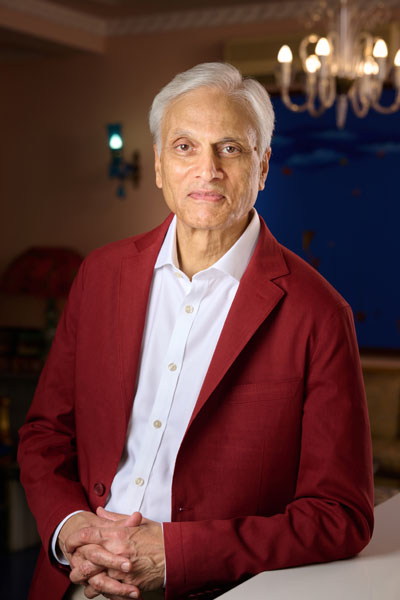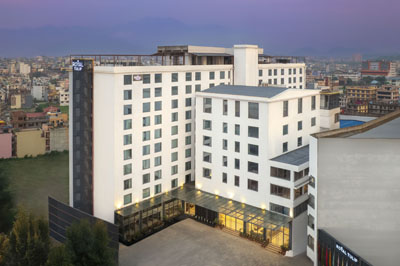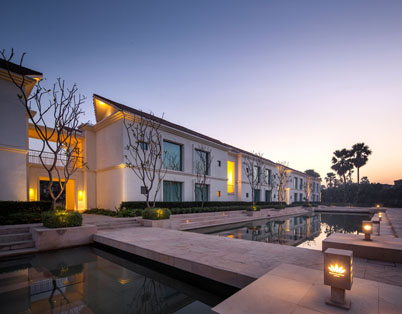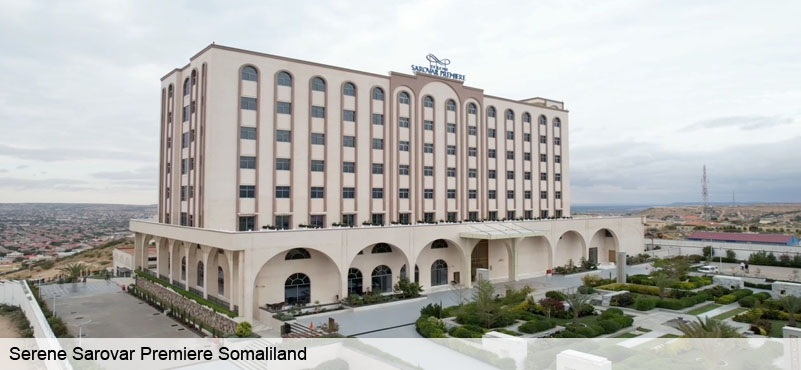Share the post "Building the Sarovar Legacy, with a Sharp Focus on Mid-market"
Sarovar Hotels is a leading hotel management company and one of the fastest-growing hotel chains in India. Headed by a team of industry veterans, the company manages over 145 operational hotels in 87 destinations across India, Nepal, and Africa, under the Sarovar Premiere, Sarovar Portico, Hometel, and Tulip brands (Royal Tulip, Golden Tulip & Tulip Inn). Sarovar Hotels covers the 3, 4, and 5-star spectrum and also operates a Corporate Hospitality Services division for business schools and corporate institutions.
With 17 regional sales & reservations offices across India, Sarovar is among the country’s most diverse hotel management companies, part of the Paris-headquartered Group Du Louvre, a major player in the global hospitality industry, managing a portfolio of 1700 hotels across 60 countries.
Here, we speak with Ajay Bakaya, the hotelier, ex-Oberoi, who joined hands with his late friend and mentor, Anil Madhok, to set up shop. Imagine, starting a hotel chain, with a target of one hotel every five years? Today, it’s an ambitious game with a few hundred on target! Bakaya, here, in conversation with Navin Berry, editor.

What has this story been like last five years, today and next five years?
The story for the last five years has been dramatic and a roller coaster. The last five years included COVID, when our world and the whole world came to a stop. That was a difficult time. We went through some innovative thoughts, like converting one of our hotels into a hospital, and we managed to save a few lives. Other than that, there were lots of lessons to be learned. We let go of a large number of people from their jobs at the worst possible time. Can one change that? Perhaps in bits and pieces? We went through frugality, we went through survival, we went through tenacity and we emerged.
2022 onwards, things have been pretty good. It was a good year. 2023 and 2024 were fantastic years. 2025 has not worked out as anticipated. but it’s still going to be a growth year. The country is growing, infrastructure is growing, airports, seaports, roads, all of that is going to benefit us. The most recent GST reforms, despite our objections to some of the provisions, are a strong signal for more value to the common man. So, the last five years have been exciting and a very special time for India.
How has your growth been in comparison with your industry peers?
The next five years is again a strong growth story. The fundamentals in the country are very strong. On perhaps difficult precipitous times as far as the Middle East is concerned and as far as Ukraine is concerned. We’re also sitting at a stage where sooner or later we would perhaps have to tilt a little bit more in one direction or the other towards or against the Americans. It’s a changing world order when it comes to trade and economy. But overall, India’s fundamentals are extremely strong, both in terms of manufacturing and in terms of services. And in terms of GDP, a growth of 6.5 to 7% percent is enviable, considering we’ve maintained that or better over the last few years. So overall, a very positive scenario for India. A dearth of hotel rooms and hotel beds. Huge demand as we connect more cities and more towns with better infrastructure.

What has been the underlying philosophy behind picking hotels, locations, destinations?
Sarovar has grown perhaps the fastest in the country. If not the fastest, then among the fastest, amongst the top two or maximum three. But I think that’s the wrong way of looking at things. That’s how boards of companies look at business. Growth, growth, and year. Growth, growth, and more growth. Our concern has got to be, as a management company, what are we delivering to owners versus the promise when we sign up a property with them? And I think that’s an area of concern. We are growing very rapidly. We will continue to grow rapidly. We now need to be more selective in what we sign on.
And if you believe we can’t add the right value, we should not be signing on properties. So, our focus over the next few years is not going to be purely on growth. It’s going to be on a prudent selection of what we sign on and how we develop. We have several brands. Our homegrown brands are strong. Sarovar Portico is a mega brand in the country now. We have about 75 hotels under the brand. We will continue to build our brands under a strong management platform. We are developing the Golden Tulip and Royal Tulip brands, both under management and franchise, and we still manage third-party brands. a number of hotels for the Radisson Hotel Group. So, its a growth story, strong, good, but going forward, more sensible than just growth.

Growth with profits, let us hope profit is not a bad word? How have profits chased you in this ten-year period, last five and next five?
Profit can never be a bad word in business. The underlying principle of business, whatever your philosophy, is that the business must make money. More so for a management company where we are handling hotels for different owners. And we are looking at somebody else’s investment, and we need to make sure that the investment produces maximum possible returns while it’s handled prudently for the long term. So yes, definitely profits. The company must be making profits. Profits must be growing year on year, given a good background scenario to operate in. But in a good playing field, yes, profits are important, profits will play a prime part in the business.
At the same time, there must be an underlying philosophy to push the business forward. If that underlying philosophy is solely profit, then business, in my opinion, will not grow beyond a point.
Sarovar has been profitable from its inception. Other than the two years of COVID, we have not had a negative growth year or a negative profit growth year. So far, we don’t intend to change that trend. We will continue to be profitable. We will continue to grow our top line. We will continue to grow our bottom line. At the same time, we will combine a strong strategy in terms of how we take our development forward and what directions our development moves in.
Looking back to your early years, what was the initial idea behind Sarovar?
The idea at Sarovar’s birth, let us say our ‘Naamkaran’ and ‘Mundan’ years, was to grow ambitiously one hotel a year for the next five years. The idea was to provide strong management systems and processes and professional people, in the mid-market that did not exist in India at that time. We’re talking 30 years ago, when you had the top end and you had complete rubbish at the bottom. So, we were amongst the pioneers in that segment of 60 rooms to 150 rooms, four-star, bottom end, a five-star, three star. Where you were not paying for the extra-large lobby, you’re not paying for the half a dozen restaurants and more dining areas and banqueting areas, if all you needed was a good room to sleep in and a decent breakfast and decent dinner when you come back from work.
That idea has blossomed, has continued to grow. The idea is backed by the fundamentals of professional people, strong processes, good sales and marketing and tremendous amount of respect for the owner. In our company, in our business, we cannot survive without our owners. Word of mouth for Sarovar is our strongest calling card. We have hotels that perform brilliantly. We have hotels that perform poorly for some reason or the other. But I do not believe that we’d have an owner who would have something negative to say about us.
You are now owned along with Radisson having the same parents. How does this synergy hold for you both?
We have a friendly but arm’s length relationship with Radisson. Yes, we have the same grand parentage, so to say, but we work as independent companies. In some cases, we compete for the same business, for the same hotel properties. We work closely together in terms of procurement. We share ideas when it comes to development, but we continue being independent companies with very different character. Sarovar is more feet on the ground. ear to the ground, hand on the pulse, a thrifty, efficient mid-market company.
Operating with diverse sub brands has become the core philosophy globally. A luxury chain like IHCL has branched into AMA and Ginger! Lemon Tree has a luxury brand? We don’t hear too much of brand and segment play from Sarovar?
We have complete clarity and complete focus on the fact that we are a mid-market brand. We are essentially mid-market. Yes, we operate in the luxury segment. We have several hotels that are in the luxury category, but that’s not our DNA. That’s not our core. Our core strength lies in operating mid -market hotels. We will build on that strength. We don’t want to get carried away with illusions. We don’t want to get carried away with egos. We don’t want to get carried away with the need or the perceived need for top-end luxury hotels. We will continue to grow in our space. There is lots of growth potential there. The bigger growth story is always going to be in the mid-market in a developing country, and we are happy being in that segment. We are unabashedly mid-market.
When I talk to you I cannot but recall the dynamism of Anil Madhok, your co-founder! Would you say you are staying on course in line with his vision?
Anil Madhok was a man of total clarity. There was never any doubt in his mind on the way forward. On what we had embarked upon, what we wanted to achieve. Part of that vision, part of that philosophy, part of the dynamism was good quality, great value for the money that the customer is paying us, strong focus on housekeeping and hygiene and cleanliness, strong focus on good quality food on the plate and the palate, strong focus on training. And the results, he said, would always follow. We continue on the same path. I think if he was with us today, he would perhaps be a little disappointed on the fact that with the talent crunch in the country and with the speed of growth, we are not able to provide top end value to our owners and to our guests, as much as we would like or should.
And we are moving to correct that but very definitely, overall, his vision, his philosophy, his thinking, his guiding principles continue to guide us today and will definitely guide us for the future.





